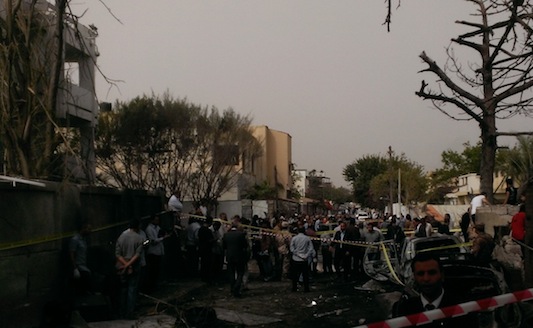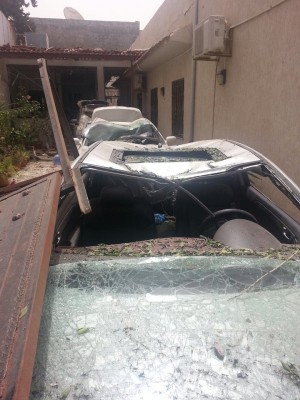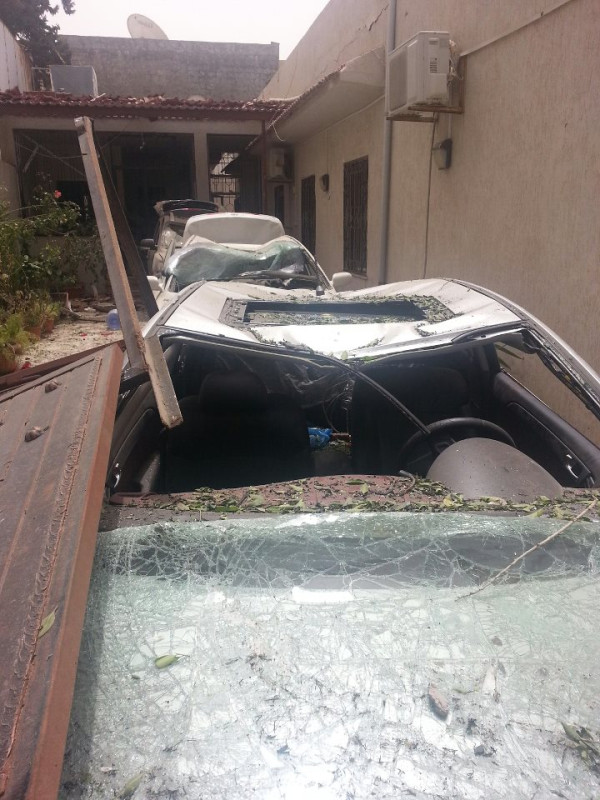By Nihal Zaroug.

Tripoli, 23 April 2013:
The attack on the French Embassy has drawn widespread condemnation, anger and sadness across Libya. France . . .[restrict]is held in the highest esteem for its backing of 17 February revolution.
Libya’s Foreign Minister Mohammed AbdulAzziz, was one of the first this morning to strongly condemned the attack, labelling it as an act of terror against a “brotherly nation”.
Many view the blast as an attack on the revolution itself. Expressions of regret, shock, anger and humiliation could be read on social media networks. How could this happen, they asked, and why to an ally like France.
An Amazigh activist tweeted: “If you want to fight the French inside Libya then get the heck out because we, the true Libyans will fight you instead.”
A medical student from Tripoli tweeted that the popularity of France and its former President Nicholas Sarkozy is such that it is on display even at weddings with songs about “Sarkozy and the French jets that saved them”.
Nisreen Adham planned “We condemn the Bombing of the French Embassy in Libya” – an event to be held behind the French Embassy at 5:30 pm this evening, in a show of “support to the families of those injured in the bombing, to condemn the act of terrorism against Libya and France, and to say to the world that Libyans are outraged and reject such actions.”
A petition condemning today’s bombing has been circulation online. It calls for Libya and Western governments to bolster Libya’s security forces to “protect the development and sovereignty of the country and the people living there”. The petition also condemns last September’s attack on the US consulate in Benghazi.

Alaa Murabit, co-founder of The Voice of Libyan Women, weighs in with her reaction to the sentiment expressed by many who feel “ashamed for Libya”. She wrote on Facebook:
“I don’t think the Libyan people have anything to be ashamed of. Every person I have spoken to today has without hesitation strongly condemned this attack and reiterated that it in no way represents Libyans as a whole. So maybe instead of proving how remorseful we are, it is time to step up and actually demand – and create mechanisms – so that our government, GNC and media be held accountable.”
Others blame active pro-Qaddafi factions intent on destabilising the country. France’s role during the revolution and the destruction by French fighter planes of Qaddafi’s tank column heading towards Benghazi on 20 March 2011, are cited as possible motives for this morning’s explosion.
However, many feel that this group is being scapegoated for the lack of security provided by the Ministries of Interior and Defence and by the army. According to Facebook post by Congressman Alaeddin Mgariaf, the Interior Minister and Head of the Intelligence Service will be summoned by Congress to speak on the bombing.
The prevailing speculation on social networks, however, is the embassy was targeted because of the French intervention in Mali, with fingers being pointed at Jihadist groups. An alternative view is that while Mali was the reason, today’s bombing was done not by an Al-Qaeda offshoot but by Libyan Salafists.
Anas El Gomati, director of Sadeq Institute, said on Twitter that “today’s episode at the French Embassy is completely different challenge for the government. This isn’t (the task of ) disarming militias, it is counter terror.”
Seven months ago, Benghazi was shaken by the attack on the US consulate which resulted in the death of US Ambassador Chris Stevens and three other American diplomatic personnel. Following and the targeting of other diplomats, Benghazi was left largely void of diplomatic missions. There are fears the same could happen in Tripoli as a result of the French embassy bombing.
In protest over Steven’s death and in a call to put an end to militias, residents of the Eastern city, held a massive protest to “Save Benghazi”, which resulted in the storming of the compound of the Ansar Al-Sharia brigade, the Islamist group suspected of involvement in the murder of Stevens.
Today’s events have sparked calls for mass rallies to be held on Friday, 26 April, in Tripoli and Benghazi.
However, the organisers also want the removal of the Chief of Staff, Yousef Mangoush, who is blamed for the lack of security in Libya. They say he has enabled the lawlessness perpetuated by extremists and terrorists groups to happen, stating that “extremist militias” have been targeting the “police, the courts and foreign embassies”. They are demanding that the government takes a stand to end the existence of militias, in the interests of building a state based on rule of law.
[/restrict]








